No products in the cart.
Prudent parenting in the lockdown era
Parenting in lockdown era – PW presents advice gathered from psychologists and parenting experts on ways and means parents can empower children to cope with the rigours of the Covid-19 national lockdown and the summer holidays which will prolong the at-home period of children to early June and July, if not longer – Cynthia John, Jayalakshmi Vaidyanathan & Mini P.

The rampaging Coronavirus aka Covid-19 pandemic, which has infected 6.19 million people and killed 370,000 worldwide including 208,000 affected and over 5,800 killed in India, and forced a national lockdown of industry and business and mass closure of education institutions, is playing havoc with the psychological and emotional well-being of hitherto active children and adolescents suffering incremental anxiety, fear and stress. According to a recent study titled ‘The Psychological Impact of Quarantine and How to Reduce it’ published in the globally respected medical journal Lancet (March 2020), an assessment of quarantine and isolation in precedent pandemics indicates high prevalence of “emotional disturbance, depression, stress, low mood, irritability, insomnia, post-traumatic stress symptoms, anger and emotional exhaustion,” in human beings.
Beyond anxiety about the health of elders and loss of personal freedom and mobility, the pandemic lockdown has forced families indoors, straining and damaging personal relationships. Inevitably, women and children are bearing the brunt of the lockdown, which has been especially harsh on low-income and poor households. In India, the National Commission for Women has reported a sharp increase in domestic abuse and violence with 587 complaints registered between March 23 and April 16 — almost double the complaints received in the previous 25 days. Moreover, the Central government’s Childline India has reported 92,000 calls from abused children between March 25-April 8 — a 50 percent increase after the national lockdown was dramatically announced in a nationwide broadcast by prime minister Narendra Modi on March 24. The lockdown has resulted in closure of all manufacturing plants, business offices and suspension of public transport and forced confinement of all urban residents countrywide.
“With family members forced to remain indoors 24/7, fear of contracting the virus has been exacerbated by financial anxiety and stressed inter-personal relationships transmitted through verbal and non-verbal messages. This stress manifests in the form of irritability, anger, and frustration and usually the most vulnerable family members — children and women — bear the brunt,” says Dr. Sangeetha Mahesh, psychologist and relationship consultant and founder-director of Psycafe, Chennai.
Dr. Mahesh believes that children internalise parental fears of the pandemic and associated financial, socioemotional and health anxieties. “Young children may not understand the seriousness of the Covid-19 crisis but witnessing their parents engage in conversations laced with anxiety and fear makes them anxious and insecure. They react by crying, shouting and sulking. In such situations, parents need to be calm and positive, assuring children of their complete love and attention,” advises Mahesh.
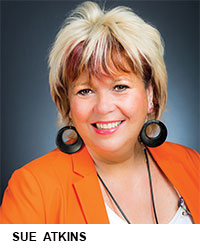 UK-based internationally respected parenting expert and author of the best-seller Parenting Made Easy — How to Raise Happy Children (and PW columnist), Sue Atkins warns that the likes of the rampant coronavirus pandemic hasn’t been experienced for over a century with parents having no precedent to fall back upon to cope with national lockdowns. Atkins believes that in the circumstances, it’s natural for children to experience anxiety and stress. “In such an unimaginable situation children are certain to feel anxious and suffer angst. Therefore, it’s quite possible they will regress to thumb sucking, bed wetting and throw temper tantrums. In such moments, parents need to be patient, gentle and kind to them,” says Atkins.
UK-based internationally respected parenting expert and author of the best-seller Parenting Made Easy — How to Raise Happy Children (and PW columnist), Sue Atkins warns that the likes of the rampant coronavirus pandemic hasn’t been experienced for over a century with parents having no precedent to fall back upon to cope with national lockdowns. Atkins believes that in the circumstances, it’s natural for children to experience anxiety and stress. “In such an unimaginable situation children are certain to feel anxious and suffer angst. Therefore, it’s quite possible they will regress to thumb sucking, bed wetting and throw temper tantrums. In such moments, parents need to be patient, gentle and kind to them,” says Atkins.
 In India most middle class families, spoilt by easy availability of cheap domestic labour, have had to learn to adjust to new realities, apart from appreciating household help. Comments Jennifer Moses, counsel ling psychologist, Prerna Academy, Bangalore and mother of two children, Derek (14) and Dalvi (11): “Without our maid servant to help, I have to do all the cooking and cleaning, household chores and care for my children and aged parents. In addition, I continue my counselling work from home. But I am learning to cope and have worked out a daily schedule. Also, the lockdown has forced me to rethink my parenting style. I realise now that I was a pushy parent, always pressuring my sons to excel. Slowly, I am learning to give them the freedom to make their own choices, self-discipline themselves and make their own study schedules, including digital screen time usage. Most important I have inspired them to help with household chores and learn cooking — all essential life skills.”
In India most middle class families, spoilt by easy availability of cheap domestic labour, have had to learn to adjust to new realities, apart from appreciating household help. Comments Jennifer Moses, counsel ling psychologist, Prerna Academy, Bangalore and mother of two children, Derek (14) and Dalvi (11): “Without our maid servant to help, I have to do all the cooking and cleaning, household chores and care for my children and aged parents. In addition, I continue my counselling work from home. But I am learning to cope and have worked out a daily schedule. Also, the lockdown has forced me to rethink my parenting style. I realise now that I was a pushy parent, always pressuring my sons to excel. Slowly, I am learning to give them the freedom to make their own choices, self-discipline themselves and make their own study schedules, including digital screen time usage. Most important I have inspired them to help with household chores and learn cooking — all essential life skills.”
Moses believes the upside of the coronavirus crisis and national lockdown is that it has taught sentient members of the national parents community and over-indulged middle and upper class children several valuable lifestyle and soft skills lessons which will stand them in good stead after the national and state lockdowns are lifted. “For one, it has taught all of us to be more appreciative and respectful of our household help. There’s a widespread tendency within middle class and affluent households to under-estimate the value of maid servants, cooks, gardeners — all of whom have their own families to nurture and educate — to our comfort and well-being. Secondly, the lockdown has made me aware that children want to — and will — learn on their own, given modest encouragement and inspiration. Academic excellence is only one facet of education,” says Moses.
In the pages following, we present advice gathered from psychologists and parenting experts on ways and means parents can empower children to cope with the rigours of the Covid-19 national lockdown and the summer holidays which will prolong the at-home period of children to early June and July if not longer.
Personal hygiene & physical well-being
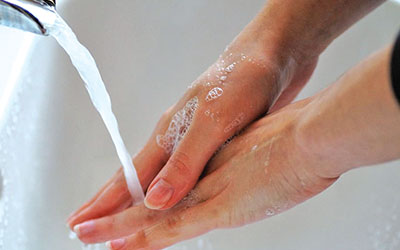 Parents need to follow expert advice and encourage children to maintain personal hygiene and healthy lifestyle. Some guidelines:
Parents need to follow expert advice and encourage children to maintain personal hygiene and healthy lifestyle. Some guidelines:
Teach children to wash hands thoroughly with soap — for at least 20-30 seconds. An easy way to time it is to get children to sing the full happy birthday song while doing so. Particular care should be taken to wash your own and their hands after nose blowing, coughing and/ or sneezing, after visiting a public space, touching surfaces outside the home, including money, and before and after meals.
Model proper sneezing and coughing etiquette. Cover the mouth and nose with a flexed elbow or tissue when coughing or sneezing. Dispose of used tissue immediately, and wash hands.
Explain to children why they need to avoid touching their faces (mouth, nose, eyes). Lead by example. Avoid shaking hands, hugging or kissing, sharing food plates, cups and towels.
Wipe kitchen and other metal surfaces clean with disinfectants at least twice daily. Also ensure that toilets are cleaned regularly.
Ensure children get adequate sleep. Insufficient sleep lowers their body immunity.
Include exercise in the family’s daily routine. Exercise boosts blood circulation, releases endorphins and expels toxins while maximising the body’s germs-fighting power.
Avoid processed foods with artificial preservatives and additives. Eat natural, healthy foods which include immunity boosting spices such as turmeric, garlic, pepper and ginger.
Parenting in lockdown era – Talking to children about Covid-19
 Children are constantly exposed to television news, dinner table conversations, and social media. Therefore, they tend to be well aware that the world is beset by the Coronavirus pandemic that’s killing thousands of people. Even if they don’t show it, they are worried about their parents contracting the virus and falling ill and that they might be separated from their loved ones. It isn’t easy to explain this 0.06 micron virus to children but it needs to be done in an age-appropriate manner.
Children are constantly exposed to television news, dinner table conversations, and social media. Therefore, they tend to be well aware that the world is beset by the Coronavirus pandemic that’s killing thousands of people. Even if they don’t show it, they are worried about their parents contracting the virus and falling ill and that they might be separated from their loved ones. It isn’t easy to explain this 0.06 micron virus to children but it needs to be done in an age-appropriate manner.
ParentsWorld presents guidelines to explain Covid-19 to children:
• Ask your child — whatever her age — what she knows about the Coronavirus. This will help you dispel myths.
• Preschool children won’t know much about viruses and their deadly potential. Therefore, explain the phenomenon in terms they understand. “‘Some people are getting sick because of a new type of sickness — the Coronavirus. Most of them get well but some become very sick. Because of this, we need to make sure that it doesn’t enter our bodies. That’s why we are now not going out and meeting people.’ You could also use videos and pictures to explain harmful and benign bacteria,” advises Dr. Swati Popat Vats, founder-president of the Early Childhood Association, India.
• Follow your child’s lead. Some children may want to talk about the pandemic, others may be fearful.
• Educate them about precautions such as hand washing, wearing masks and social distancing.
• Limit children’s exposure to negative news about the pandemic. Explain that scientists the world over are working hard to find a curative vaccine.
• Be positive and reassuring when you speak to them, because children can pick up a lot from your tone.
• If your children are anxious after your Covid-19 discourse, encourage them to share their fears. Children think differently, and their worries may not just be about a loved one who may fall ill or die. For instance, their biggest fear may be that they will miss out an annual opportunity to visit a water park, or not get to visit their cousins this year. Don’t trivialise these fears. Instead, give suggestions about how they can connect online with friends and relatives.
• Children worry about grandparents and other loved ones. Encourage them to video chat with friends and grandparents.
Work from home guidelines
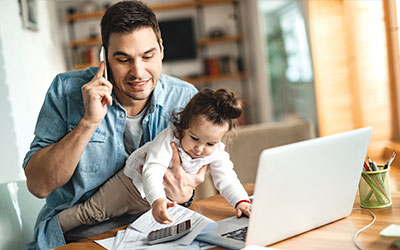 With epidemiologists predicting that the Covid-19 pandemic is likely to take a year to run its full course, work from home (wfh) is here to stay. Here’s a precis of survival guidelines collected from several industry leaders, sociologists and psychologists for parents struggling to balance paid employment and child care with domestic chores.
With epidemiologists predicting that the Covid-19 pandemic is likely to take a year to run its full course, work from home (wfh) is here to stay. Here’s a precis of survival guidelines collected from several industry leaders, sociologists and psychologists for parents struggling to balance paid employment and child care with domestic chores.
• Parents especially of young children should be realistic about the number of hours they can work from home. Plan a daily schedule and negotiate wfh core and flexi hours with employers.
• Ideally, parents should work in shifts, taking turns to supervise children.
• Parental conversations about the pandemic, economic downturn and job losses should be conducted in private, away from children.
• Focus on boosting children’s mental and physical health, rather than academic learning.
• Don’t insist on children’s schoolwork and don’t fret about their skipping a online class or two. Instead, during the prolonged holiday encourage children to research subjects that interest them.
• Allow children few hours free time every day to do whatever they want.
• Encourage them to learn household chores such as cleaning, dishwashing, and cooking that will stand them in good stead when they grow into adulthood.
• Avoid punishing children, especially teens, by threatening to take away their phones and computers. Isolation can severely depress and unbalance children. Encourage online communication with friends.
• Keep children informed about the latest good news and developments to reduce anxiety and stress.
Parenting in lockdown era – Managing pandemic anxiety
 Consultant neuropsychiatrist, sleep disorder specialist and chief executive of the People Tree Mind Care Hospital, Bangalore, Dr. Satish Ramaiah believes that all people are experiencing a roller coaster ride of emotions such as denial, non-acceptance, fear, self-doubt, financial anxiety and insecurity about the well-being of loved ones. “In vulnerable people — especially elders and children — these emotions manifest by way of heightened stress, depression, fatigue, disturbed sleep and loss of appetite. It is important to counsel and calm them against these disturbing phenomena,” says Dr. Ramaiah.
Consultant neuropsychiatrist, sleep disorder specialist and chief executive of the People Tree Mind Care Hospital, Bangalore, Dr. Satish Ramaiah believes that all people are experiencing a roller coaster ride of emotions such as denial, non-acceptance, fear, self-doubt, financial anxiety and insecurity about the well-being of loved ones. “In vulnerable people — especially elders and children — these emotions manifest by way of heightened stress, depression, fatigue, disturbed sleep and loss of appetite. It is important to counsel and calm them against these disturbing phenomena,” says Dr. Ramaiah.
Dr. Ramaiah’s prescription for parents to combat pandemic-related anxiety: captive children with constant activity. Contrary to popular belief, spells of boredom and masterly inactivity are beneficial for the cognitive growth and development of children.
Encourage them to grab some sunshine. Exposure to the sun’s rays speeds up the production of vitamin D which boosts immunity and releases serotonin. This keeps children calm, positive, and focused.
Follow Covid-19 prevention measures advised by health experts and government, scrupulously. Ascribe anxiety to information overload.
Don’t communicate your anxiety through aggressive behaviour. Immerse yourself in productive, enjoyable and meaningful activities.
Appreciate others’ anxiety without rubbishing it. Reassure elders and children about beneficial outcomes of following expert advice.
Explain the pandemic to children in age-appropriate language, and ways and means to protect themselves against it.
Be responsible, decisive, confident, and safe.
Balance study & play
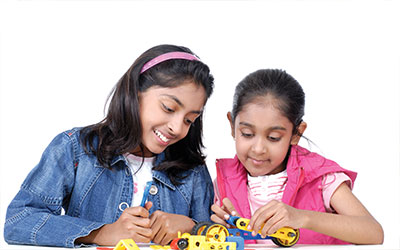 Some guidelines for balancing children’s study, play and reflection time during the lockdown period:
Some guidelines for balancing children’s study, play and reflection time during the lockdown period:
Designate a work space for each child to do her study, assignments and online learning.
Draw up a daily time table jointly with children. Most children love structured learning and school discipline, even if they won’t admit it.
Use timers, the home equivalent of the school bell. Try to model their day at home on the in-school day. But desist from imposing academic learning 6-8 hours per day as in school. Allow time for co-curricular music, dance, reading, learning, sports education and connecting with friends.
Encourage children to help with household chores by packaging them as valuable learning experiences. Ensure they eat well, remain hydrated and play every day.
Inspire them to engage in altruistic activities, e.g, to raise funds for a charity.
Simultaneously, resist the temptation to overwhelm captive children with constant activity. Contrary to popular belief, spells of boredom and masterly inactivity are beneficial for the cognitive growth and development of children.
Encourage them to grab some sunshine. Exposure to the sun’s rays speeds up the production of vitamin D which boosts immunity and releases serotonin. This keeps children calm, positive, and focused.
Also read: Talking to children about coronavirus and precautionary measures





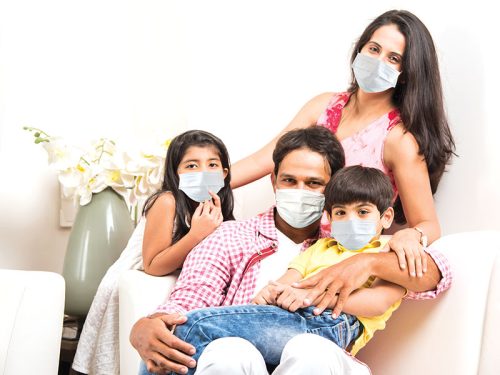










Add comment